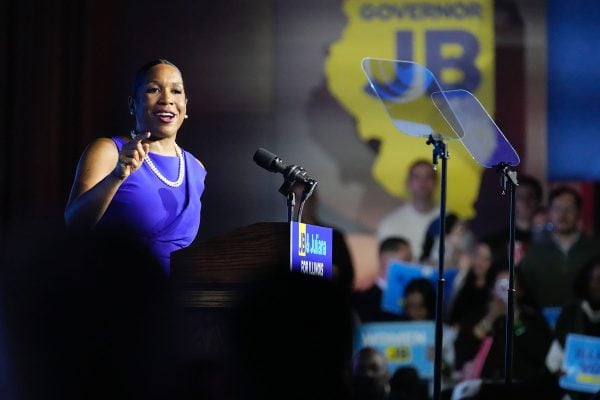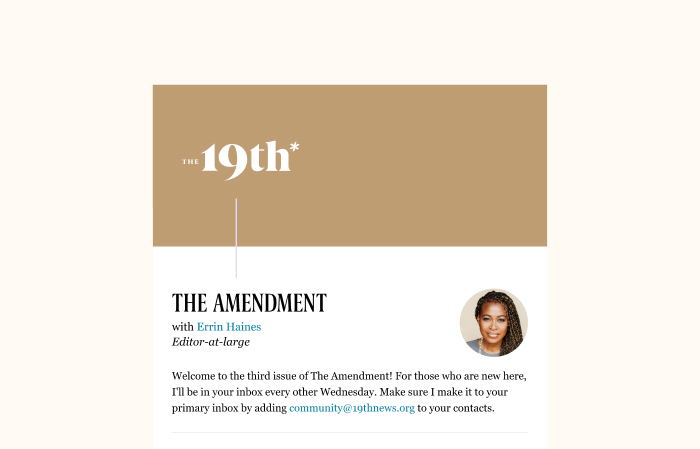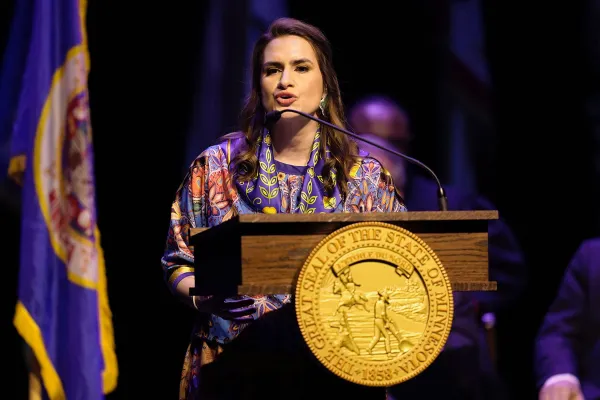At The 19th, we’re committed to publishing journalism that you can trust throughout the critical moments that shape our democracy and our lives. Show your support during our Fall Member Drive, and your donation will be matched. Double your gift today.
Minnesota Lt. Gov. Penny Flanagan, the highest-ranking Indigenous woman serving in a statewide elected office, was voted in as chair of the Democratic Lieutenant Governors Association (DLGA) on Tuesday. She is the first Indigenous woman to lead a party committee.
DLGA helps Democratic candidates win their races for lieutenant governor — a position that in some states is a separate election, and in others is secured as part of a joint ticket with the governor.
Flanagan, who is a member of the White Earth Band of Ojibwe, said she’ll lead the association with a commitment to inclusion.
“Our democracy functions best when it accurately reflects the community and seeks to represent,” Flanagan said. “And so for a very long time, women, people of color, Indigenous folks were not at decision-making tables, and too many decisions were made without us. I think if we’re going to have strong policies and strong outcomes for communities, women and BIPOC folks need to be at the table.”
Democratic lieutenant governors already are a diverse group of statewide elected officials in the country: Out of 20, 12 are people of color and 14 are women.
-
Read Next:
Kevin Holst, executive director of the DLGA, said that Flanagan has served as a thought leader for others recently elected to office, helping them navigate a role that in many states is shaped by whoever is in that office.
Lieutenant governors are first in line to fill the governor’s seat if the governor is unable to serve, and their roles differ by state. They have responsibilities in both executive and legislative branches and often use their time in office to focus on passing laws that align with their priorities and can serve in various other cabinet roles for the governor or on state boards and commissions.
“I think that is one of the most powerful parts of this role, is that it isn’t always very clearly defined,” Flanagan said. “For many of us, you’re able to craft and really build up these positions.”
In Flanagan’s case, she used her background as executive director of the Children’s Defense Fund to work on policy for children and families. So far, Democrats in Minnesota have been able to pass child tax credits and secure free breakfast and lunch for public school students this legislative session. Flanagan has publicly talked about her own struggles with food insecurity as a child, a topic she is passionate about.
In her role as DLGA chair, she’ll be responsible for fundraising for current candidates ahead of the 2024 election, and she’ll also play a part in overseeing get-out-the-vote efforts.
Already, Holst said the organization has made a commitment to spend $2 million to flip the lieutenant governor’s race in North Carolina, where the election is separate from the governor’s. In the last three elections, that seat was won by a Republican. Current Lt. Gov. Mark Robinson, a conservative Republican who is the first Black lieutenant governor in the state’s history, is running for governor in 2024. Robinson’s run for higher office is one reason the organization is targeting North Carolina, Holst said.
“It’s important that we just stamp out that brand of extreme MAGA politics at the more local level like lieutenant governor, because we know if they are elected as lieutenant governor they are the future frontrunner for governor in North Carolina,” Holst said.
Other states DLGA is focused on include Delaware and Washington, where they aim to hold the seat in 2024, and Oregon — which doesn’t have a lieutenant governor — where they are backing a candidate running for secretary of state.
The organization is also investing $1 million in a candidate surrogacy program for President Joe Biden and Vice President Kamala Harris’s reelection in swing states, where lieutenant governors could help bring out the vote. Representation is important in that messaging, Holst said.
Austin Davis, for example, is the youngest and first Black lieutenant governor in Pennsylvania, and Lt. Gov. Sarah Rodriguez is organizing the Latino vote in Wisconsin, he said.
Flanagan will play an important role too in galvanizing Native voters, Holst added.
“There’s a sizable single-digit percentage of people who identify as Native in these key swing states,” he said. “I think having someone that Native voters are able to look up to in Lt. Gov. Flanagan is just incredibly powerful to be able to show why it is so important to be a part of the electoral process.”
For Flanagan, the importance of representation in our democracy hits close to home.
“I’m a mom of a 10-year-old Ojibwe girl, and I couldn’t have ever imagined being able to see elected leaders who look like me. And for my daughter, this is simply her reality,” she said. “I think that that is the power of lieutenant governor, that our young people especially can see themselves reflected in so many of the leaders who are in these roles.
“That is how we build a strong organization. That is how we build a strong party.”








